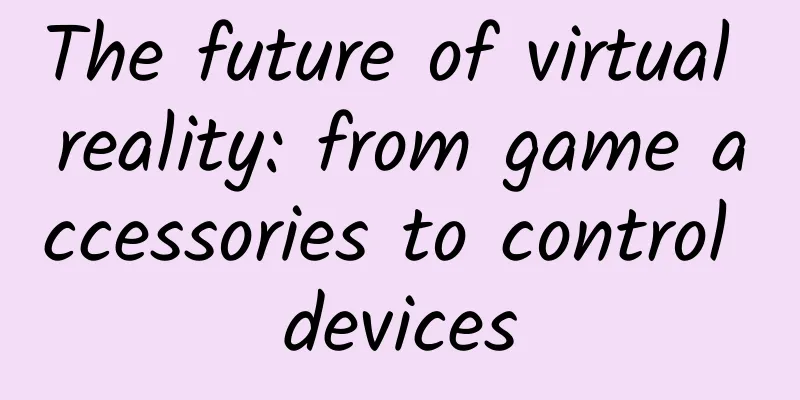The future of virtual reality: from game accessories to control devices

|
The Future of Virtual Reality A well-designed game can transcend reality, bring players into the game world, put us into different bodies, live in different times and different places. - Dave Beaudoin (game designer) When talking about the future of virtual reality, we must talk about its relationship with games. Industry analysts predict that virtual reality will explode in 2016, and there's no doubt that gaming will be key to its success. While there's a lot of excitement surrounding virtual reality right now, it's worth remembering that gamers have been waiting for virtual reality for decades, perhaps since Palmer Lacy got his first Nintendo console after gaining the support of the gaming community. Judging from the short-term success of virtual reality, all eyes were on video games, focusing on what they do best: convincing consumers to invest large sums of money in new hardware platforms. Soon, as the first generation of VR headsets were launched, major companies actively developed new games to satisfy the existing game fan base and began to convert those very popular games into VR versions, hoping to show the appeal of high-tech and meet players' expectations for VR games. But in fact, virtual reality’s significance for improving experience far exceeds its significance for games. Whether it is the old Atari 2600 (the ancestor of modern game consoles, a game console released by Atari in October 1977, which was popular at the time and became the representative console of the second generation of video games) or the newly launched PS4, gamers seem to be deeply involved in video games, but generally speaking, the core of a good game is to immerse players in it. In a 2010 blog post titled "The Psychology of Immersion in Video Games", author Jamie Madigan summarized the power that makes players addicted, which is called spatial presence. "The addiction begins when the player forms a mental model of the game's fake space. They follow the different cues (characters, actions, sounds, etc.) and imagine the game world they created. Once the mental model is created, the player must decide, consciously or unconsciously: does she like this imaginary world or the real one." Now, people can be immersed in a game without having to rely on beautiful graphics or stunning sound effects. Board games can achieve the same immersion with paper, glue and cardboard boxes (although a lot of imagination and attention are required to achieve it). For video games, because a large amount of sensor information allows players to participate in the game in real time and dynamically, the threshold for achieving immersion is greatly lowered. As Steven Kotler (American best-selling author) describes, the sense of immersion derived from the spatial presence in the game strengthens the player's psychological "flow" state - that is, the more immersed in the game. Compared with the development trend of VR games in the future, the combination of today's game content, theme and difficulty makes the game relatively less immersive. Therefore, reaching another level of overall immersion depends on the future development of VR. Thanks to the improvement of computer hardware, virtual reality can provide richer sensations and deeply simulate the real world. In addition, VR can fully realize rich sensations, which is in sharp contrast to relying on sensations from pictures and sounds. Today, we can only feel vision and hearing, but tomorrow we will be able to experience smell, taste, touch and various sensations beyond the five senses. Ultimately, achieving an operating speed that matches the brain's processing of sensory information makes the brain mistakenly think that it has entered a mysterious canyon, but in fact it is just putting "reality" into virtual reality. In this way, virtual reality may easily achieve immersion and improve fluency in the future, not just for games. So what will the long-term development be like? For example, invading the human brain. VR headsets will not only improve games, they will also improve our lives as control devices, which is really hard to imagine. |
<<: Square’s App Visibility Principles
>>: App Store data analysis for beginners of APP promotion
Recommend
Volvo confirms listing plan, Geely's equity dilution
Recently, Volvo Cars, a subsidiary of Geely, issu...
A Zhejiang woman ate a poisonous conch that looked real, causing her heart to stop beating! How can we tell the difference?
On June 9, Ms. Zhang, a 51-year-old woman engaged...
Android Selected Avatar Library Unlock Member Edition_Resource Headlines, Free Software Download
The membership has been unlocked and the ads have...
What is the deposit for Douyin showcase? Can I retreat later?
This article mainly introduces the relevant infor...
Humans not only have a dream for Mars, but also a dream for the deep sea
The Hollywood science fiction adventure film &quo...
iOS 18 hidden feature, supports T9 dialing!
In the first beta version of iOS 18, Apple finall...
The more stable iOS 12 public beta is here, and even my 5s wants to upgrade
[[234979]] The new iOS 12 and macOS were released...
What are the consequences of not being able to pay off your credit card in 2020? The consequences are as follows
What are the consequences of not being able to pa...
Apps on iPad are starting to rot
Marco Arment, a well-known foreign developer, wrot...
Why can't billions of stars illuminate the entire universe?
This ancient problem is known as Olbers' para...
BYD Han EV's first winter test in northern China: Although the range has decreased, the cost per kilometer is still less than 0.1 yuan
With brands such as BYD, Xpeng, and NIO making gr...
Please answer, is this a peony or a peony?
Pop quiz! What flower does the English word "...
Promotional Marketing: How to Start a Trend?
Lee Seung-ri, an artist from the South Korean boy...
Underground "sprint" success! my country drilled the first 10,000-meter deep well in the heart of the desert
At 14:48 on the 4th, as a diamond drill bit conti...
Does your phone need to be customized?
[[122320]] Wouldn't it be cool if when buying...









